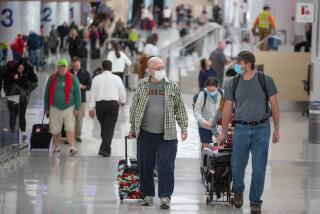BlackBerry Firm Says Overload Didn’t Cause Outages
- Share via
Research in Motion Ltd. offered few details Friday about two major outages in less than a week with its popular BlackBerry service, which delivers e-mail to wireless devices that many users affectionately call CrackBerries.
The company, which makes BlackBerry devices and provides the e-mail service over cellular networks, attributed a nearly four-hour outage June 17 to a software upgrade “that did not operate consistent with prior testing.”
The company said a second North American outage, on Wednesday, was the result of an unrelated hardware failure. In a statement, Research in Motion said a “backup system functioned with lower capacity than expected and the lower capacity then caused latency in message delivery for some customers.”
Research in Motion declined to elaborate on the number of customers affected or the nature of the software and hardware involved in the two incidents.
Cingular Wireless and T-Mobile said June 17 that service for all BlackBerry users -- at least 1 million people but probably many more -- was down nationwide nearly four hours.
Research in Motion first said the service was restored “fairly quickly.” This week a company statement said, “Some customers were impacted longer, but the majority of customers saw service return within two hours.”
Cingular and T-Mobile operate networks based on the same wireless technology. There was no outage for BlackBerry users on the networks run by Sprint Corp. and Verizon Wireless, which use a different technology. Nextel Communications Inc., which reported scattered disruptions for its BlackBerry users, uses a third technology.
Research in Motion, of Waterloo, Canada, operates data centers that steer e-mail between BlackBerry devices and companies’ internal networks.
Research in Motion said Friday that the outages were not a sign that the growing popularity of the service might be straining its systems. The number of BlackBerry users grew to 2.5 million by the end of March, up from about 1 million a year earlier.






